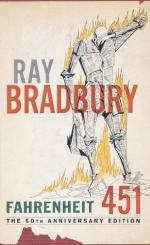|
This section contains 17,090 words (approx. 57 pages at 300 words per page) |

|
SOURCE: "Reverie and the Utopian Novel," in Ray Bradbury and the Poetics of Reverie: Fantasy, Science Fiction, and the Reader, UMI Research Press, 1984, pp. 79-110.
In the following essay, Touponce examines the utopian construct and social criticism of Fahrenheit 451 through extensive analysis of dialectic; historical and psychological effect; and reader response.
Although the utopian novel addresses itself to a reader, literary criticism has been primarily concerned with the author's point of view, paying little attention to how the reader might be affected. One notable exception to this rule is Richard Gerber's Utopian Fantasy, which brings out the important role of reader expectation in such works. In following the theme of the utopian traveller in the evolution of utopian fiction since the end of the nineteenth century, he notes that the general aesthetic problem of utopian literature—how to present us with a society already made—inevitably involves the...
|
This section contains 17,090 words (approx. 57 pages at 300 words per page) |

|


